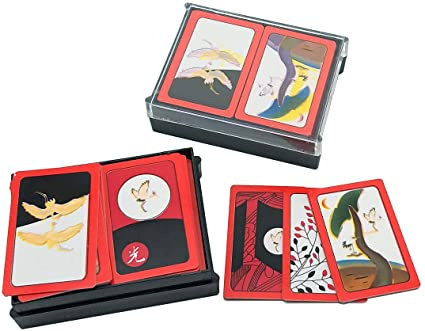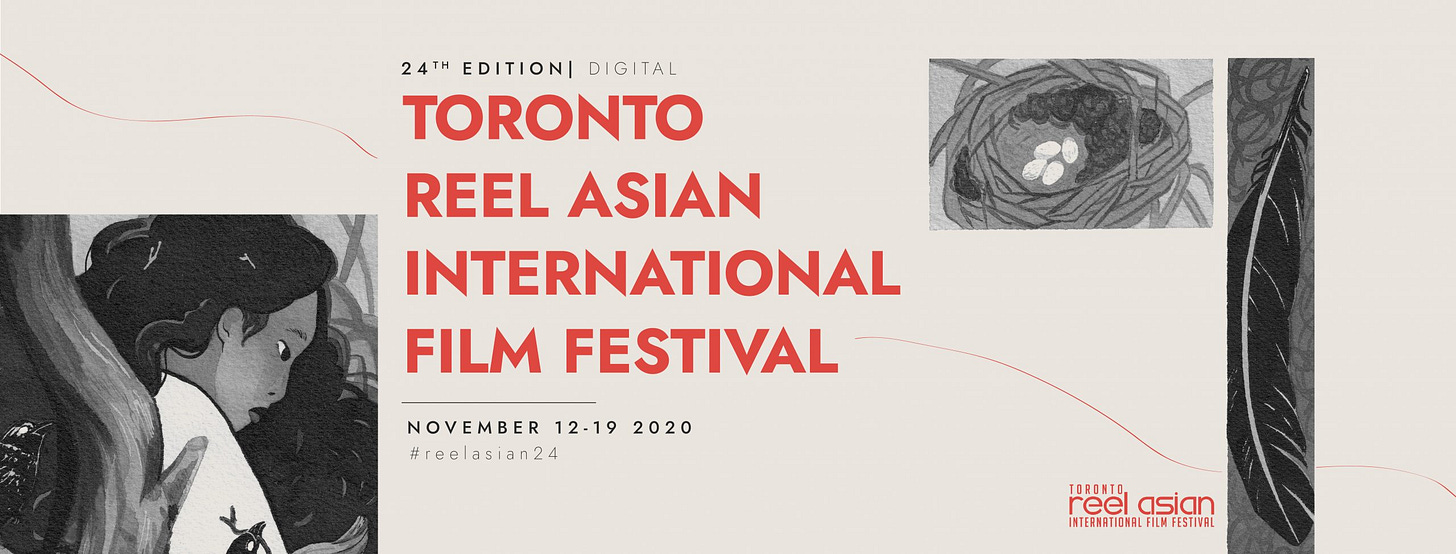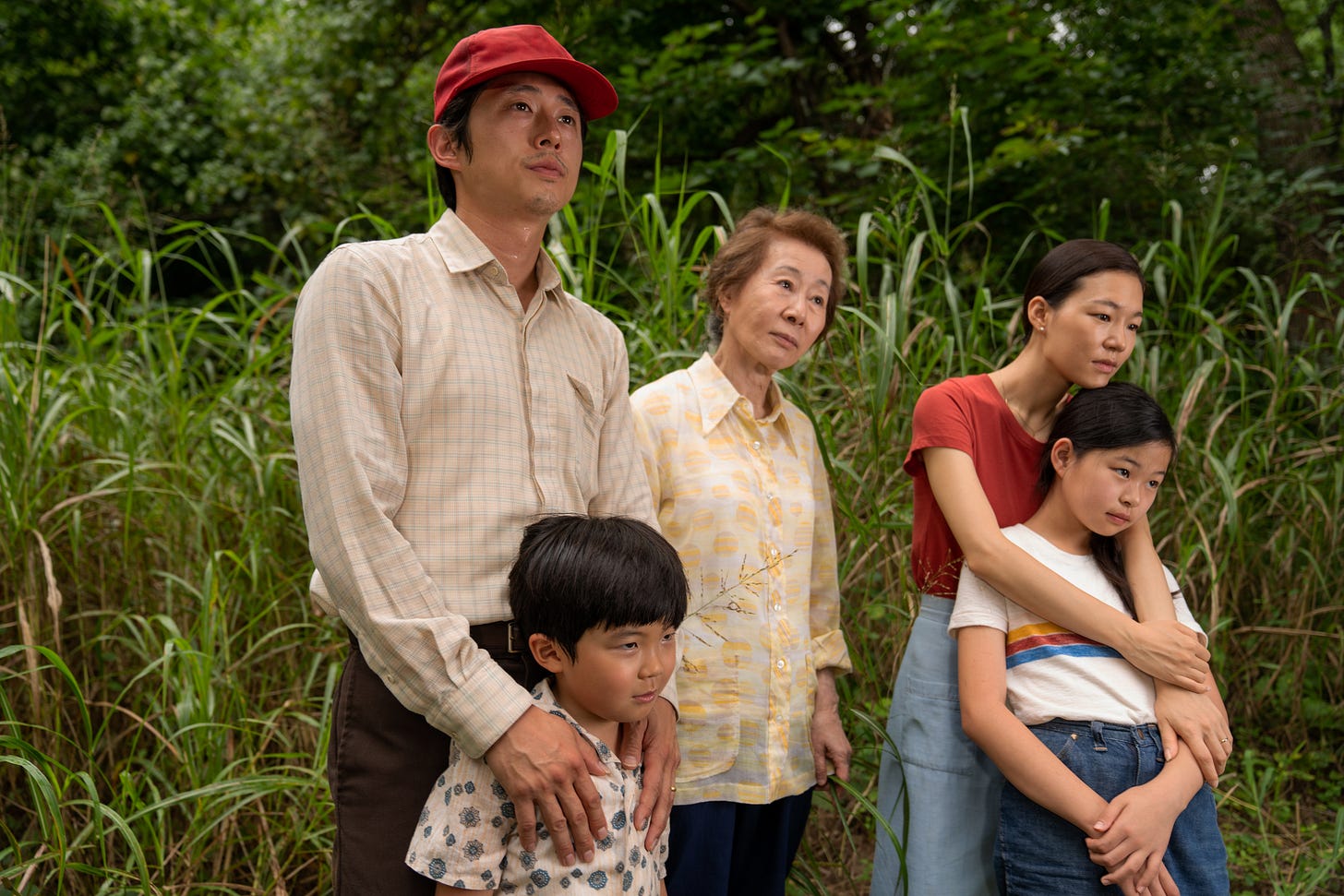Welcome to At The End Of The Day. I’m Hannah Sung and I write this newsletter to process the daily firehose of news.
I’ve had an up and down week, in terms of stress but it’s Friday, which means it’s time to decompress.
Over the last ALMOST YEAR (whyyyyyy shakes fist at pandemic), I’ve clocked lots of evening hours watching TV shows and movies, looking for escape. You probably have, too.
And of everything I’ve watched, Minari might be the best thing I’ve seen all pandemic.
Written and directed by American filmmaker Lee Isaac Chung, Minari is the story of a Korean-American family who move to Arkansas to start a farm. Minari won big at Sundance Film Festival last year and the film is experiencing award season buzz — and controversy (more on that below).
Minari gave me all the feels on a wintry, pandemic night with a deliciously slow-building story that stacked, like a house of cards, a family’s immigrant wishes, calculations and sheer, brute effort as they built a life to approximate the one they dreamed of having. It’s the kind of movie I want friends to see so we can talk about it at length.
That’s where you come in.
I’m so pleased to announce our first giveaway and to make it just for you, subscribers-only.
I’ve partnered with Reel Asian film festival in Toronto to give away four advance screening passes. You can be anywhere in Canada.
All the giveaway details are at the bottom of this email. (GOOD LUCK!)
First, ATEOD editor and entertainment journalist Ishani Nath and I discuss the sublimity of this film, the realities of the “American Dream” and representation of immigrant families in film and TV.
ISHANI: I love this movie for many reasons. First of all, it's beautifully shot. Every frame of this movie was so lush. And considering it's a story about growth in a lot of different ways, there's a lovely metaphor of planting seeds and growing roots and what they're doing with the farm as well as what they're doing with their family.
When I sat with this movie after, I was so taken in by this journey and there are very few movies these days that do that for me, considering how easily distracted I am.
And there were aspects of the immigrant experience and the American Dream that we don’t often see, in this way, that felt really compelling.
HANNAH: For me, this film felt like a revelation with every little moment. I connected with so many details in it even though the family in Minari is nothing like mine. My own family didn’t have a rural experience. Also, Koreans are known for being obsessed with education, and my parents firmly fall into that camp, but this family in Minari doesn’t even send their kids to school because they're busy doing other things! Instead, Grandma comes from Korea to babysit them in their trailer. So the connection I felt wasn’t in what they did. It was with their mannerisms, the language and also, objects, like the hwato cards.
I grew up with those in my house. But I haven’t seen any in decades. When I saw those in the movie, I was like, Oh my god, a thing that I have not seen or thought about in so long. It made me think about what it’s like when the words you say and the food that you eat is never represented, ever, ever. It is completely invisible in the world around you. It only exists in your home. And sometimes the objects that come over with new immigrants go away slowly, with time, so if your family doesn't talk about it or or bring out the hwato cards, then it'll never touch your life again. It's so weird because those are your formative experiences and tactile memories. So, I loved this movie for that.
And the Granny, in that movie, oh, my god, she's amazing.
ISHANI: I loved her. There was so much about her that was new. Historically, when there's that older generation that comes from the motherland, I find that character is often depicted as representing an old way of doing things. They're conventional, traditional, and they're usually there to be a foil for the “American” or “Western” values. And that creates a conflict that I find so frustrating, because it pits the two cultures against each other.
And with this grandmother character, her relationship with David, the little boy, was the heart that kept this movie going.
I loved how quirky she was, and that while she cared deeply about her family, she didn't care about people's preconceived notions or what she should and shouldn't do. She did her own thing and lived her best life. I loved that about her character, because I don't think that older characters tend to be given that kind of agency or depth.
Minari GIF by A24
HANNAH: This Grandma, and how outspoken she is, how she just cackles and has fun, makes me think of how Korean women are allowed to become more of themselves as they age. There are a lot of social conventions in terms of how you’re supposed to act, given your age or place in society but for an older woman, it seems you’re just allowed to be yourself now, like, you do you. You’ve earned it. You don’t have to be docile and bake cookies like David wanted. You can just teach this child how to gamble and ask for Mountain Dew all the time.
ISHANI: You mean, “water from the mountain,” as it gets called.
HANNAH: Yeah! Let’s talk about the American Dream. The reality of chasing the American Dream is that it isn’t pretty.
I loved the mom's response when she arrived at their new farm, when she was super-unimpressed and basically said, “What is this?” And Steven Yeun’s father character says, “This is our home.” And the kids are like, ‘It has wheels!”
The mom (Yeri Han) was an interesting character because she's very beautiful and you might almost think of her as being in some way delicate. But she had so much inner strength, as anybody would, who would embark on a journey like this. And she had so much rage that she was in a trailer in Arkansas. That rage and regret is a part of the American dream. That’s a feeling that I've seen in my own life and feels very familiar. The whole idea of coming here and striking it rich, achieving the glossy, capitalist American Dream, that’s the American Dream that doesn’t make any sense to me.
ISHANI: You mention how beautiful she is and how she might be seen as delicate. There’s a scene where the family goes to church, and there's two women from the community, and they keep saying, “Oh, you're so cute. Look how cute she is.” This scene felt so intentional. Like a nod to those stereotypes.
One thing that I loved about this movie, in particular, is that it didn’t hinge on race. Not like movies where the big conflict they face is xenophobic in nature. Their issues are with growing crops, setting up a business or any of these other things that are very real issues for anyone trying to make it in a new country.
There definitely are microaggressions depicted throughout the movie, but it's done in a way that felt sensitive and like it wasn't written for a white audience.
Because that's what we see in movies like Green Book where it's like, I'm going to explain racism to you through these very overtly racist experiences, and then having the person of colour explain why this was wrong. And Minari was so not that, which was wonderful.
HANNAH: Mm hmm. Are there other movies that achieve the same thing for you?
ISHANI: The one that comes to mind is The Farewell, where Awkwafina plays a young Chinese American woman who goes to China to visit her dying grandmother. That movie felt very authentic, especially because it came from writer and director Lulu Wang's real life.
In general, I keep having to remind myself, especially as someone who writes about film, the idea of “South Asian representation” or “Asian representation,” is almost nonsensical. What does that even mean? Asian representation is a continent worth of people. It's nonsense, yet it’s a reflection of where we’re at in terms of the fight for more diverse and authentic stories on screen.
HANNAH: You're using the word representation. We throw that word around a lot because we’d like more representation in film and media and news and art. But on the flip side, why should any one racialized character bear the burden of representing for anyone else at all, whatsoever? Why can't that person just live? Be the star of their own story? Be that person who is trying to go to high school and be super-hot for their crush or be a person who is trying to be a farmer at the cost of his family life?
It’s what you said earlier, that it’s about not centring a white audience and instead, making the characters the real focus.
ISHANI: So often, we forget how white-centric movies are, because that's just the norm. The way little David keeps saying, “You're not a real Grandma.” I feel like the version of that line that I heard in my community, or that I can almost imagine me saying is, “Why can't you just be normal?”
HANNAH: Oh yes.
ISHANI: But “normal” was just white. It meant the same thing.
HANNAH: For those who haven’t been following this movie, can you sum up what’s been happening with the Golden Globes controversy?
ISHANI: The Golden Globes has announced that Minari will not be a contender for Best Drama. Instead, it's been slated into the Best Foreign Language Film category. And their justification is that it features too much Korean language to be considered in the Best Drama category.
[Editor’s note: The HFPA requires that films must feature at least 50% English dialogue in order to be eligible for their top film categories].
And this is infuriating for a lot of reasons. Twitter immediately reacted, and we had huge names like Daniel Dae Kim, Lulu Wang and Simu Liu, all emphasizing that Minari is an American story. It was written and directed by an American, it features American actors and is set in America. It just happens to include Korean dialogue because it is about a Korean American family. You know, this exact thing happened with The Farewell.
HANNAH: It did?
ISHANI: Yeah, and it was more complicated in that scenario, because a lot of that movie took place in China. So I think it was hard to use the justification that it takes place in America.
HANNAH: Yeah, but think of any movie where an American travels the world. That's still an American movie.
ISHANI: Exactly. But this just shows how deeply entrenched and how closed-off these award shows have been to certain narratives and people. If you think about how we award movies, it’s just emblematic of a larger structural issue. Looking at the institutions, and why we don't get more movies featuring people of colour, why we don't get narratives like this, why we don't get stories that feel like they represent more than just white audiences, this is part of it, looking at what we hold up as the best films versus what is classified as “foreign”.
It's infuriating to me that the Golden Globes can't see it and that it's not the first time this has happened.
It’s so emblematic of many of the issues in the movie itself. In a perverse way, it’s almost like an ad for the movie, because this controversy relates so directly to the themes of placehood and identity and belonging that are so central to Minari.
HANNAH: There are definitely parallels with the immigrant reality and the myth of the American Dream. For a filmmaker like Chung to mine his own personal story, and then scrape together the social capital and the studio representation to get a movie made, well, a major award is the equivalent of the American Dream. And the team that made Minari is not even in the running for the category they belong in. They don't even get a place at the starting line.
ISHANI: Well, look at those two categories that they're debating, between Best Drama versus Best Foreign Language Film. By classifying it as Best Foreign Language Film, you're immediately saying this is other, this is different. This language doesn't belong. And it just reminds me of the phrase, “You're in America, speak English,” or, “You’re in Canada, speak English.”.
The conversation around language also reminds me of Parasite’s run through award season and how Bong Joon Ho repeatedly talked about the importance of language. He referred to it as getting past “the one-inch-tall barrier of subtitles” and how much amazing cinema you would open yourself up to, if you could just get past the idea experiencing a film in another language
And with this movie, the language is so key. It's so linked to the identity of the characters and to not accept them as American is reflective of where we're at right now.
I hope Minari opens more doors and conversations because it's such a fantastic film, and there's so much to talk about here. I hope that, Golden Globes aside, it has a great award season because I think that this movie is another one that could change a lot of things down the road.
HANNAH: I totally agree.
Minari’s details, the specificity, the chicken farm, the cutting yet casual insults from children, the bedding folded up during the day and laid out at night, the bold graphics of those hwato cards, so much of it felt familiar to me and yet new, too, to see it all in a North American-made film.
The slow, confident storytelling that builds up to a tumble of life-altering epoch-changing, events in a family’s life makes for a movie that is just a great movie, plain and simple. But for obvious reasons, this film will mean even more to immigrant kids like myself and Ishani and maybe you, too.
Life and work and home and everything in an ongoing pandemic is grinding and tough. We need moments of escape. I hope you’re finding some for yourself these days, along with moments of peace, excitement and engagement with the best people in your lives.
Thank you for reading,
Hannah
✨✨✨This newsletter is edited by Ishani Nath✨✨✨
THE MINARI x AT THE END OF THE DAY GIVEAWAY
I’ve partnered with the awesome folks at the Toronto Reel Asian International Film Festival to give away 4 screening codes to Minari. And it’s just for you — ATEOD subscribers only!
Here’s how to win:
1. Hit reply to this email. Just write back with “MINARI.”
2. If you’d like an extra chance to win, cc: a friend you think would be interested in reading my newsletter (make sure it’s an actual friend – I like friends-of-friends but there’s no need to spam!).
3. I’ll be picking four winners based on pre-determined numbers (in other words, it’s random!). If you win, I’ll send you a code so you can to watch Minari, anywhere in Canada, starting Friday, Feb 5 @ 9 pm ET for a 24-hour window.
4. THIS CONTEST CLOSES Monday, February 1st @ 8 pm ET. Winners will be contacted by Wednesday, Feb 3.
Good luck, friends!
I’ve moderated panels or otherwise collaborated with the Toronto Reel Asian International Film Festival over the years.
I’ve seen films through Reel Asian that I wouldn’t have had access to otherwise. The conversations they drive, the art and documentaries they feature, I’m grateful for their work.
This year, Reel Asian is celebrating their 25th year as a non-profit arts organization and they aren’t able to hold their annual fundraiser gala.
That’s how this brilliant advance screening of Minari came together, as a fundraiser. If you are inclined, and looking to support the non-profit film and arts sector, click through for their donations page and learn more about their festival and year-round programming. Thank you, Reel Asian!








